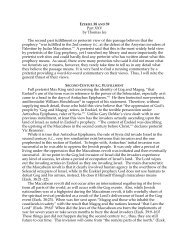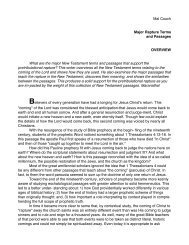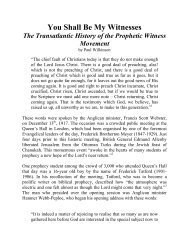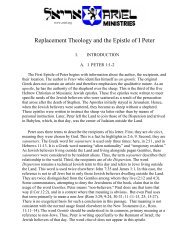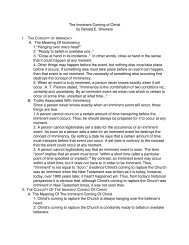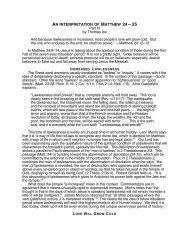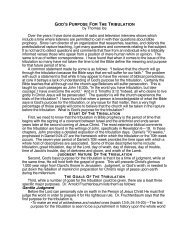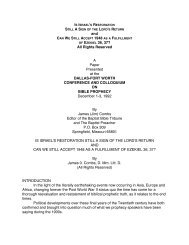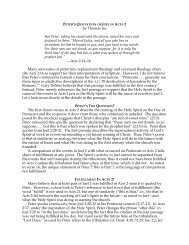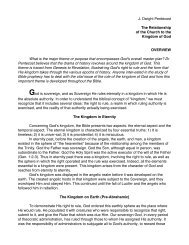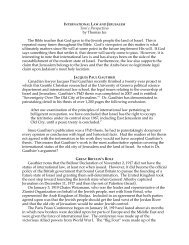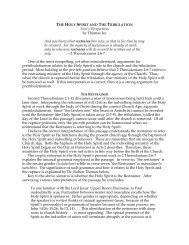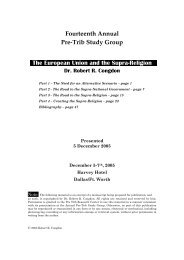PDF version - Pre-Trib Research Center
PDF version - Pre-Trib Research Center
PDF version - Pre-Trib Research Center
You also want an ePaper? Increase the reach of your titles
YUMPU automatically turns print PDFs into web optimized ePapers that Google loves.
Christian Zionism History — Ice — Page 20<br />
better than actual people I knew.” 176 His Christian Zionist beliefs were well developed<br />
and deeply rooted long before he became <strong>Pre</strong>sident of the United States. <strong>Pre</strong>sidential<br />
Counsel Clark Clifford described Truman’s<br />
own reading of ancient history and the Bible made him a supporter of the<br />
idea of a Jewish homeland in Palestine, even when others who were<br />
sympathetic to the plight of the Jews were talking of sending them to places<br />
like Brazil. He did not need to be convinced by Zionists. . . . All in all, he<br />
believed that the surviving Jews deserved some place that was historically<br />
their own. I remember him talking once about the problem of repatriating<br />
displaced persons. “Every one else who’s been dragged away from his<br />
country has someplace to get back to,” he said. “But the Jews have no place<br />
to go.” 177<br />
Truman’s Christian Zionism came into play during two of the greatest decisions<br />
that he would have to make during his <strong>Pre</strong>sidency: First, how should the U. S. vote on<br />
the partition of Israel, which would result in the creation of the new Jewish state, during<br />
the United Nations vote in late November of 1947? Second, should the U. S.<br />
diplomatically recognize the newly formed nation when David Ben-Gurion declared the<br />
birth of Israel on May 14, 1948?<br />
On both issues, virtually all of Truman’s personal advisors, the State Department<br />
and the military establishment were opposed to him. Saddington notes:<br />
Truman’s most trusted foreign policy advisers, almost to a man, were deadset<br />
against the establishment of a Jewish state in Palestine. The president<br />
faced the formidable front of General Marshall, Under Secretary of State<br />
Robert Lovett, Secretary of the Navy James Forrestal, Policy Planning Staff’s<br />
George Kennan, State Department Counsel Charles Bohlen, and Marshall’s<br />
successor as secretary, Dean Acheson. Loy Henderson, director of NEA, who<br />
arrived at the State Department just three days after FDR’s death, also<br />
opposed the Zionist aims. William Yale, also at the State Department, said<br />
that the creation of a Jewish state in Palestine would be “a major blunder in<br />
statesmanship.” When Secretary Forrestal reminded the president of the<br />
critical need for Saudi Arabian oil in the event of war, Truman said he would<br />
handle the situation in light of justice, not oil. 178<br />
Truman dealt with both issues by applying his “the buck stops here” approach with<br />
tough, responsible decisions. “Truman instructed the American delegate at the U. N.,<br />
Herschel Johnson, to announce U. S.’s endorsement of the UNSCOP partition plan on 11<br />
October 1947.” 179 Then, seventeen minutes after David Ben-Gurion’s declaration of the<br />
new state of Israel, a cable was sent to Israel and a message went to the press from the<br />
White House announcing the following:<br />
This government has been informed that a Jewish State has been proclaimed<br />
in Palestine, and recognition has been requested by the provisional<br />
government thereof.<br />
The United States recognizes the provisional government as the de facto<br />
authority of the new State of Israel. 180



